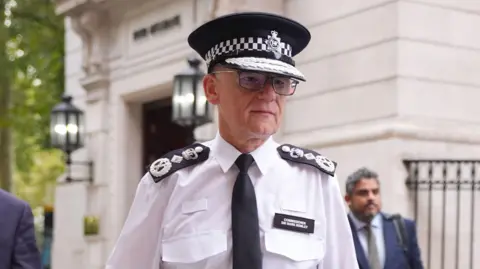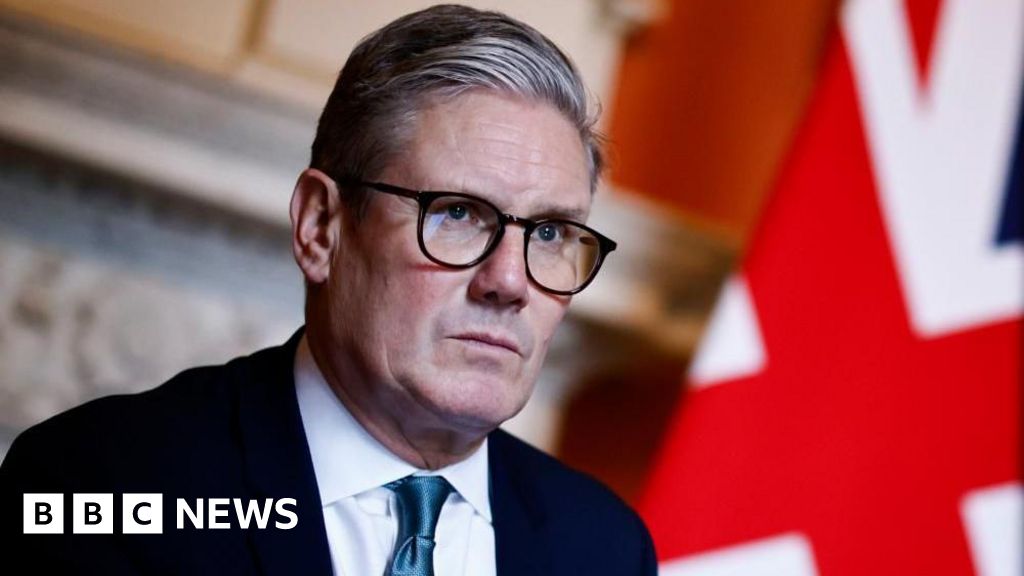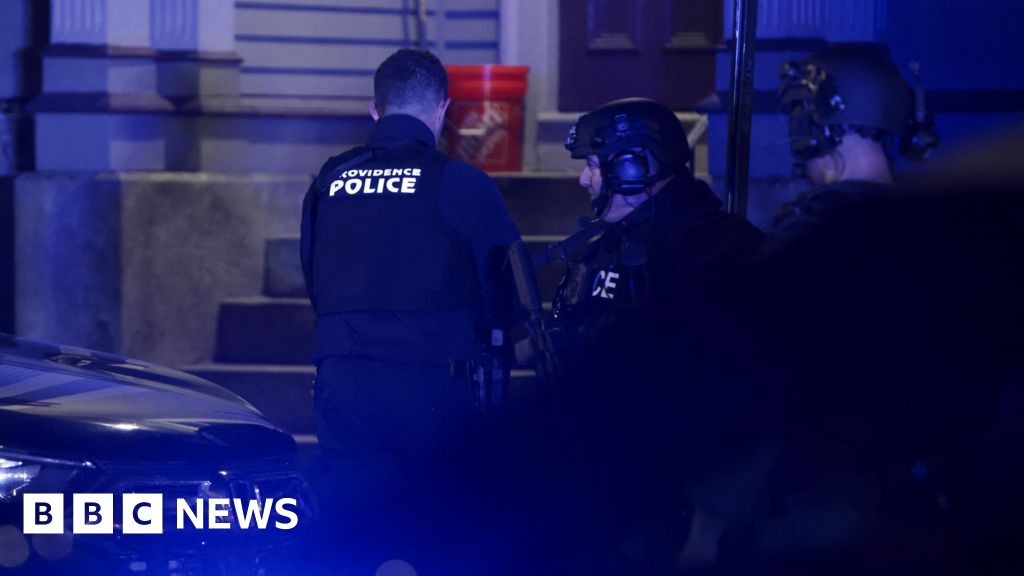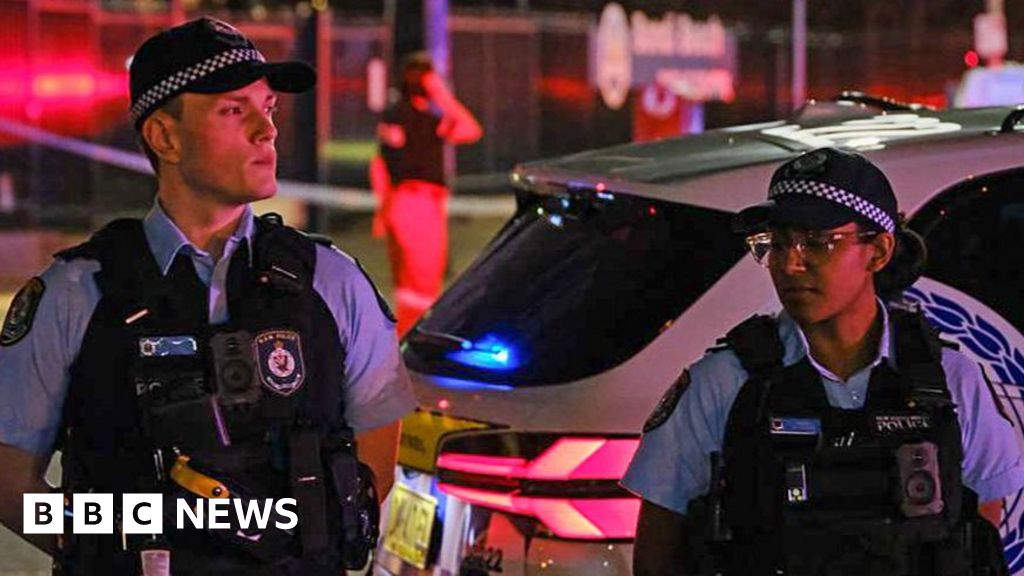
 PA Media
PA Media
Metropolitan Police Commissioner Sir Mark Rowley has written to the home secretary and the mayor of London after a BBC investigation found misogyny and racism inside the force.
Footage captured by a Panorama undercover reporter showed serving Met officers calling for immigrants to be shot, revelling in the use of force and being dismissive of rape claims.
Here is the Met chief's letter in full:
Dear Home Secretary and Mayor,
Tonight's BBC Panorama Undercover in the Police has once again placed a spotlight on the culture and standards of the Metropolitan Police Service. The behaviours of some of the Met officers and staff featured in the show are reprehensible and completely unacceptable.
In the programme we saw appalling, potentially criminal, behaviour from officers, that lets down our communities and will cause Londoners to question if they are safe in our custody, and whether they would be believed and respected as victims of crime. This damages trust and confidence, and I have apologised to those we serve.
It's my expectation that for those involved, where there is incontrovertible evidence of racism, misogyny, anti-Muslim sentiment or bragging about excessive use of force, they will be put on a fast-track hearing within weeks and on a path to likely dismissal. We stand ready to work with the IOPC to make this happen.
As Commissioner, I have been candid about the longstanding systemic, cultural, leadership and regulatory failings that have allowed misogyny, racism and a lack of public service ethos to put down deep roots. We are part way into conducting what is already the biggest corruption clear-out in British policing history, more robust than the Met has been historically and relentlessly arresting and sacking officers and staff - with nearly 1,500 removed so far.
In light of the deep concern that I know Londoners will have following Panorama, I wanted to share a detailed update with you on the immediate steps we took upon being alerted by the BBC; provide an update on our relentless focus on culture and standards, and share how this focus will continue as we deliver New Met for London 2 - the next phase of our reforming strategy.
Immediate Actions
The Met was alerted to these allegations by BBC on 9th September in the form of a 13-page letter. Within 48 hours of the letter being received, nine officers and one staff member had been suspended, with two more officers being removed from frontline duties. The Met also referred these allegations to the IOPC who have since taken the investigation independently, with the Met's full support.
The Met and the IOPC have both asked the BBC to share any further information they hold to support the investigation. This has not yet been forthcoming, but we are hopeful that now the programme has aired that the BBC will ensure that any relevant material they hold is shared with the IOPC and the Met without delay. The broadcast tonight was the first time that the Met and IOPC have seen the transmission – we expect that the IOPC will now consider whether any of the initial misconduct or criminal assessments need revising as part of their investigation.
Alongside the immediate suspension and restriction decisions related to the 12 officers and staff featured, we have taken wider immediate and uncompromising action to handle this case. There are clearly deep-rooted issues related to Charing Cross which we need to address. Therefore, we:
- Dismantled the custody team at Charing Cross, with 34 dedicated detention officers immediately moved to alternative custody sites. All 16 Charing Cross custody sergeants were removed from their positions and posted into other non-custody parts of the organisation. These officers are being closely monitored and supervised to ensure they are upholding our values and professional standards.
- Inspectors based in Charing Cross custody have been removed within the last two weeks and replaced. We are making changes to the leadership team in our Custody command.
- We are also making senior leadership changes at the wider Central West BCU, which covers Westminster, Kensington & Chelsea and Hammersmith & Fulham boroughs. This includes movement of Chief Inspectors and Superintendents.
- Have asked our independent custody assessors to increase the regularity of their visits, so they can better help us to identify areas of concern.
- We are reviewing several complaints relating to custody to make sure any isolated or more systemic issues are identified and pursued.
- More widely across Custody teams city-wide, we have also begun a rolling process to rotate all Custody Sergeants who have over two years' tenure.
These steps are a specific response to the allegations that the BBC put to us, they are unprecedented and decisive, and begin to address an unacceptable culture.
Clearing out Corruption
These immediate actions are in line with the plan we set out in New Met for London to deliver our mission of 'more trust, less crime and high standards'. As you know, three years ago I stated that we would be ruthless in tackling those who corrupted the Met's integrity and began the biggest police corruption clear-out in British history.
As part of this we dedicated a further 200 officers to proactively uncovering and dealing with wrongdoing. The results are significant. Since 2020 we have also seen forced exits treble with 550 officers and staff being exited last year. Over the last three years almost 1,500 people have left the Met, having failed to meet our standards. Alongside this, our officers and staff are increasingly confident to report wrongdoing. Thanks to their courage and conviction we have seen internal reporting treble since 2021/22.
In parallel with exiting those not suitable, entry standards were tightened, resulting in a notable increase in vetting rejection rates from historic standards from around 5% in 2021 to 10% in 2024.
Whilst this is progress, I am under no illusion that this clear-out is complete; we are still arresting and dismissing officers weekly and we will be relentless until the job is finished. We are also now probing deeper into the corrupt networks and cliques that our actions have driven underground. This was a theme of the BBC investigation, and we are pursuing it.
Tackling Culture
In addition to the unprecedented blitz we have made on standards, we have made major strides in addressing some of the cultural issues which have in the past hindered the Met's ability to gain the trust of our communities, and more than ever before we are asking Londoners to be the arbiters of our progress.
Whilst under no misconception whatsoever at the scale of the problem, and recognising that much more needs to be done, we have made progress in building trust – 81% of Londoners agree the Met is doing a good or fair job and 74% of Londoners agree the Met is an organisation that they can trust.
We have also seen the confidence gap between female and male Londoners close and trust among Black Londoners increase by 10% over two years. Victim satisfaction has also improved from 59% to 63% in the past year.
As part of our efforts to address cultural issues, 40,000 Met staff and officers have received bespoke training on the values we expect those within the Met to follow, along with additional training to recognise and combat victim-blaming behaviours. This is not a one-off, it is [an] embedded feature of training at all ranks of the organisation.
Whilst these stats show that significant progress has been made, we recognise that this process of cultural change will take much longer than three years, and will require us to push harder, further and in different ways.
The vast majority of our people join policing with a vocational sense of public duty. We are determined to support even more staff to report wrongdoing and the abuse of power. We will equip and develop our leaders to help them succeed in driving lasting cultural change.
Next Phase: New Met for London 2 (NMfL2)
In July we published our draft New Met for London 2 document for consultation. This plan sets out how we will continue our determined efforts on culture and standards. The behaviour in the BBC documentary shows we still have a way to go. We must, and will, focus relentlessly on culture and standards, at the same time as maintaining our improving crime performance.
As part of NMFL2, we will:
1. Improve support for victims and reporters of wrongdoing. The work to date has led to a tripling of reports and we will go further:
- We will increase awareness of established confidential, accessible channels for reporting culture and leadership failures.
- Accelerate the creation of a specialist Victim Support Team, trained in trauma-informed approaches and cultural sensitivity.
- Every victim will be provided with a named caseworker for continuity and to improve trust and confidence.
- Implement stronger protective measures – such as temporary redeployment and flexible working - to safeguard victims during and after investigations.
2. Leadership Development
We have some outstanding leaders who deliver excellent results and display care and empathy for communities. Our best leaders have helped deliver the progress so far, but all leaders will need to do more as we eradicate the embedded cliques and networks left behind as we clear out the volume.
As part of NMFL, we will continue to invest heavily in improving training and equipping our leaders, this includes:
- Creating a new leadership framework, guiding principles and values to underpin leadership development programmes.
- Established a Leadership Academy. We are in our second year of delivering this to our leaders ensuring they have at least 5 days of training and development per year.
- We have introduced a new performance management process which in its second year has achieved over 90% compliance.
- We are reforming our promotion processes to ensure we select leaders who we are confident will be effective leading culture change while driving up performance.
However, the events at Charing Cross show that our leadership values are not universally adopted and embedded across the whole of the Met. They also show the abuse of the power of leadership. We still have some leaders who allow these behaviours to embed and systemic discrimination to continue. We will intensify our support and development of leaders – supporting and developing our organisation's role models and removing those who either can't or won't improve. Strong leaders, who are present and curious and demand the right behaviour from colleagues will continue to thrive.
3. Harden our policies and innovate how we use data to spot trends in problematic behaviour. Our anti-corruption unit is currently running multiple covert operations, looking at cases involving racism, misogyny and criminal relationships.
- As part of our commitment to tackle standards in the Met through modernisation and data-driven improvements, we are exploring how advanced technology can help us make better use of the data we already hold.
- Working with a leading expert in data integration and analytics, we are testing new ways to use AI and data insights to supercharge our ability to gain clearer insights into our workforce. This approach will help us identify where we need to intervene and spot trends early.
- Based on an intelligence-led process started six months ago, we plan to update our declarable associations policy. The secrecy around Masonic links can create a lack of trust – with the public and with other colleagues. It can also create behaviour which puts personal advantage over public service or creates expectations of special treatment.
4. We will bring even more external scrutiny and community involvement so Londoners can hold us to account to a greater extent than ever before.
- We have already asked our independent custody assessors to increase the regularity of their visits, so they can better help us to identify areas of concern.
- We have recognised inconsistencies in community scrutiny work and will soon be presenting a new model – for rollout across the Met – which will ensure this is done effectively in every borough, including broader scope and proper co-ordination across London.
- We are holding an event in all 32 London boroughs, by the end of the year, to hear more about communities' views on the New Met for London 2 plan and how we can deliver it together. With our first two events happening this week - in Brent on Monday, and Hillingdon taking place tomorrow.
- The new Met Engage platform allows communities to raise local concerns, share their views on our policing priorities and give direct feedback to their local policing teams without having to attend a ward panel event.
- Independent Advisory Groups will continue to provide robust challenge and advice across many areas of operational activity in the Met.
- We are also held to account by London Policing Board which was introduced by the Mayor following Baroness Casey's review and provides expert advice and scrutiny across culture, standards, performance, finance and operational fields.
- The Met and City Hall will also shortly share with Londoners the details on the planned jointly commissioned progress review recommended by Baroness Casey.
The events unveiled at Charing Cross show that our work is far from complete, and for the appalling behaviour displayed, which damages the trust our communities put into the Met, we are truly sorry.
We have made significant progress in clearing out corruption and improving our standards and culture over the past three years. This progress stands on the determination of the good majority of our people who have stepped forward and reported wrongdoing at three times the rate.
We are all committed to this continued relentlessness until that job is finished and as we seek to improve it is vital that we draw even closer to our communities and partners to ensure we are actively listening to feedback and continually striving to deliver policing that puts the public first.
I remain optimistic about delivering our mission of 'more trust, less crime and high standards' and know that the good majority, thousands of officers and staff, are delivering on this mission every day.
Thank you for your continued challenge and support.
.png)
 2 months ago
11
2 months ago
11








 English (US) ·
English (US) ·